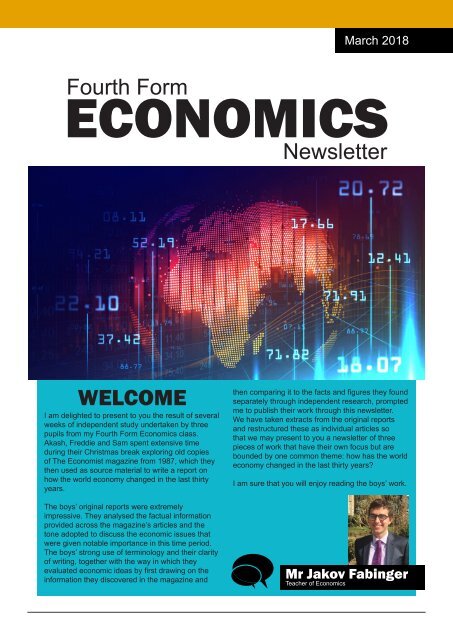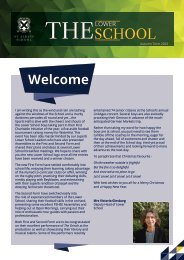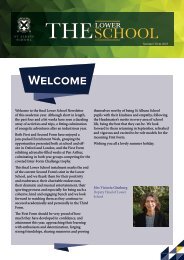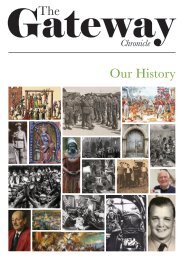Fourth Form Economics Newsletter 2018
Create successful ePaper yourself
Turn your PDF publications into a flip-book with our unique Google optimized e-Paper software.
March <strong>2018</strong><br />
<strong>Fourth</strong> <strong>Form</strong><br />
ECONOMICS<br />
<strong>Newsletter</strong><br />
WELCOME<br />
WELCOME<br />
I am delighted to present to you the result of several<br />
weeks of independent study undertaken by three<br />
pupils from my <strong>Fourth</strong> <strong>Form</strong> <strong>Economics</strong> class.<br />
Akash, Freddie and Sam spent extensive time<br />
during their Christmas break exploring old copies<br />
of The Economist magazine from 1987, which they<br />
then used as source material to write a report on<br />
how the world economy changed in the last thirty<br />
years.<br />
The boys’ original reports were extremely<br />
impressive. They analysed the factual information<br />
provided across the magazine’s articles and the<br />
tone adopted to discuss the economic issues that<br />
were given notable importance in this time period.<br />
The boys’ strong use of terminology and their clarity<br />
of writing, together with the way in which they<br />
evaluated economic ideas by first drawing on the<br />
information they discovered in the magazine and<br />
then comparing it to the facts and figures they found<br />
separately through independent research, prompted<br />
me to publish their work through this newsletter.<br />
We have taken extracts from the original reports<br />
and restructured these as individual articles so<br />
that we may present to you a newsletter of three<br />
pieces of work that have their own focus but are<br />
bounded by one common theme: how has the world<br />
economy changed in the last thirty years?<br />
I am sure that you will enjoy reading the boys’ work.<br />
Mr Jakov Fabinger<br />
Teacher of <strong>Economics</strong>
INTERNATIONAL COOPERATION<br />
In the 1980’s, during a troubled time for the world economy,<br />
governments were eager to coordinate and cooperate in<br />
their economic policies. This article explains the benefits of<br />
inter-government cooperation through the concept of game<br />
theory and compares the approaches to coordination now<br />
and what we saw in the late 1980s.<br />
Government cooperation can have three big<br />
advantages. Firstly, it would be more likely that<br />
the goals of different governments would work,<br />
because together they could set targets, and both<br />
would probably end up satisfied. Secondly, with<br />
two governments cooperating, the policy would be<br />
more effective, as they can both take measures to<br />
reach the desired target. For example, if countries<br />
have a target for their exchange rates against<br />
each other, they can both intervene on the foreign<br />
market or change their interest rates, making the<br />
outcome easier to achieve. Thirdly, international<br />
cooperation means that governments can enter<br />
into contracts with each other. They can use<br />
these foreign obligations to protect their policies<br />
from any domestic opponents. The benefits of<br />
cooperation can be explained through the theory of<br />
the prisoners’ dilemma; two partners in crime are<br />
separately offered the same deal - if both confess,<br />
they both get ten years in jail. If one confesses,<br />
he will go to jail for one year, while the other gets<br />
twenty years. If neither confess, they both get three<br />
years. They don’t cooperate, and both conclude that<br />
they are better off to confess, so they both get ten<br />
years, however if they had cooperated, they could<br />
have gotten away with three.<br />
In 1987, the world economy was more independent<br />
than ever before, but it was thought that by<br />
coordinating macroeconomic policies, the economy<br />
would run more smoothly. There were three main<br />
areas where governments cooperated. These were;<br />
coordinated intervention in the foreign market to<br />
change exchange rates, working together to make a<br />
free trade market which discouraged protectionism<br />
and the cooperation of industrial countries to help<br />
the developing ones pay off debt and avoid a<br />
financial crisis.<br />
One key example of government cooperation was<br />
in 1985, where the leaders of the 5 main industrial<br />
countries met in New York and decided that the<br />
value of the dollar needed to be driven down.<br />
Through intervention in the foreign market and by<br />
other means, the dollar fell to Y158 in 1987, a fall<br />
of 40% from 1985. This had benefits, for example<br />
cheaper exports, therefore a rise in demand, helping<br />
reduce the current account deficit of the USA.<br />
The GATT was a legal agreement between many<br />
countries, with the objective of promoting fair<br />
international trade by reducing or eliminating trade<br />
barriers. In 1986, the GATT expanded to areas such<br />
as services, capital, textiles and agriculture. 123<br />
countries took part in this, which is now known as<br />
the Uruguay Round. This helped to create a freer<br />
market.<br />
Developed countries helped to solve the debt crisis<br />
in the 1980s by lending money to those in debt,<br />
however in return they demanded that the country<br />
was to adopt austerity, cut inflation and prevent<br />
wage increases.<br />
Cooperation in the 1980s was vital; it helped to cut<br />
America’s budget deficit by weakening the dollar,<br />
opened up a free, fair international trade system and<br />
helped to prevent a potential economic crisis.<br />
Now, in 2017, we are starting to see less intergovernment<br />
cooperation in some areas. For<br />
example, the UK is in the process of leaving the<br />
European Union, which will certainly mean that the<br />
UK will cooperate less with European countries.<br />
This will affect trade dramatically. Trade deals<br />
with Europe will have to be renegotiated; this is<br />
something the government is struggling with at the<br />
moment, and it is looking increasingly unlikely that<br />
all trade deals will not be sorted within the 2-year<br />
period. Tariffs may be imposed on UK exports,<br />
which would decrease demand for some goods<br />
e.g. Mini cars, which are manufactured in the UK.<br />
The fall in cooperation may not just be regarding<br />
exchange rates, debt and trade, but possibly in<br />
terms of immigration. When the UK does eventually<br />
formally leave the EU, immigrants will find it much<br />
harder to enter the UK, as the free movement rule<br />
will no longer apply. Some view this as a good thing,<br />
as this would eliminate some competition for jobs,<br />
however others believe that immigrants are vital to<br />
the economy. For example, many are willing to do<br />
vital jobs others are not willing to do, for example<br />
farming. Also, some migrants who arrive are highly<br />
skilled and can fill jobs in professions such as<br />
medicine. However, an increase in skilled migrants<br />
can lower the wages of established skilled workers<br />
and an increase in unskilled migrants lowers the<br />
wages of other unskilled workers. This may explain<br />
the resistance of immigration shown by some.<br />
However, it could be argued that cooperation is even<br />
more necessary than it ever was, as governments<br />
face new threats which have not been problems<br />
in the past. For example, the Paris Climate Accord<br />
was signed in 2015; a clear indication that nations<br />
are willing to cooperate to solve the most prevalent<br />
issues. As we have seen in the Middle East, in<br />
countries like Syria, governments have cooperated<br />
to fight dangerous organizations - e.g. Islamic State.<br />
This has been very effective, as forces from the UK,<br />
USA and France have driven IS out of their main<br />
territories, such as Mosul.<br />
We are also seeing protectionist schemes being<br />
enforced by governments in order to protect<br />
domestic businesses. This is done by limiting<br />
or taxing imports so national firms have less<br />
competition and can thrive within the economy.<br />
Since the 2008 financial crisis, 60 of the world’s<br />
leading economies have adopted more than 7000<br />
protectionist schemes. These protectionist measures<br />
demonstrate a lack of willingness to cooperate, as<br />
governments are focussing on their economy, rather<br />
than the economies of other nations. This differs<br />
from what we saw in 1986, where governments took<br />
action to create a freer market, rather than a more<br />
closed one.<br />
It is clear that the need and use of government<br />
cooperation has changed over the last 30 years.<br />
In some areas, for example security, coordination<br />
has become more important than ever, however<br />
in other areas, as governments seek to become<br />
more independent, there has been a reduction<br />
in inter-government coordination. The outlook on<br />
cooperation has changed, and is likely to change<br />
again, so will we see a more interdependent world<br />
economy, or will it become more interlinked?<br />
Freddie
BUSINESS AND FINANCE<br />
In 1987 business confidence was<br />
very high with new technologies<br />
and a quickly growing stock<br />
market. Today, whilst new<br />
technology has become very<br />
promising and stock markets have<br />
kept rising, businesses are a lot<br />
less optimistic.<br />
In 1987 business confidence was driven by a<br />
rising stock market. In August the Chancellor of the<br />
Exchequer increased interest rates by 1 percent.<br />
The investors were scared and the FTSE 100 index<br />
fell by 4%. However overall the market was still<br />
trading at a near high. The reason for the rising<br />
stock market:<br />
• Rising corporate profits - Adverts in the<br />
Economist suggest an increase in cooperate<br />
profits, for example British Airways profits for<br />
the quarter to June 1987 were up by 300<br />
percent. Profits in Commercial Union, a British<br />
assurance company, nearly doubled in the first<br />
six months of 1987 compared to the previous 6<br />
months. 1986 and 1987 were very strong years<br />
for the stock market.<br />
• Corporate activity - The market was known as<br />
the bull market that hadstarted in the summer<br />
of 1982 and was extremely powerful. This bull<br />
market was encouraged by low interest rates,<br />
harsh takeovers, leveraged buyouts and lots<br />
of mergers. The business attitude of the time<br />
was that companies could grow a lot simply<br />
by repetitively acquiring other companies. In a<br />
leveraged buyout, a company would raise a<br />
massive amount of capital by selling junk bonds<br />
to the public. Junk bonds are bonds that pay<br />
high interest rates because of their high risk<br />
of default. The capital raised through selling<br />
junk bonds would go toward the purchase of the<br />
desired company. Initial Public Offerings were<br />
when a company issues stock to the public<br />
for the first time which led to great market<br />
excitement.<br />
• Technology - Microcomputers now known as<br />
personal computers were becoming very<br />
popular. In theEconomist article there is an<br />
advertisement on the Motorola’s new supermicrocomputer.<br />
In the advertisement it says<br />
“Motorola’s System 8000 is a perfect computer<br />
for any company committed to growth,<br />
productivity, and the ever-changing demands of<br />
competitive business.” People viewed the<br />
personal computer as a revolutionary tool that<br />
would change our way of life and create<br />
wonderful business opportunities.<br />
Today, business confidence (or lack of) in the UK is<br />
driven primarily by Brexit. Chris Williamson, Chief<br />
Economist at IHS Markit, said: “Companies have<br />
become increasingly worried about the business<br />
outlook, largely as a result of heightened political<br />
uncertainties and the potential impact of Brexit.” This<br />
decrease in business confidence is caused by the risk<br />
of losing ability to trade tariff free with their biggest<br />
and nearest trade partners. This has resulted in less<br />
investment into businesses that rely on exports to EU<br />
countries. Businesses are also transferring workers<br />
into offices in the EU in preparation for a hard Brexit.<br />
Banks and insurance companies in the city may lose<br />
their passporting rights. This will increase their costs<br />
as they have to pay for more workers and office<br />
space.<br />
Goldman Sachs have recently opened offices in<br />
Frankfurt. Lloyd Blankfein, the CEO of Goldman<br />
Sachs recently described Brexit as a “monumental<br />
and irreversible” decision and has called for<br />
a second referendum. Businesses don’t like<br />
uncertainty.<br />
However, one positive effect of Brexit is a<br />
depreciated sterling which has made businesses<br />
more competitive globally, and our exports are<br />
cheaper for overseas buyers. This has resulted in<br />
more companies increasing their level of production<br />
and some increase in confidence in the export<br />
sector. However according to the Office of National<br />
Statistics the UK posted the largest trade deficit in<br />
15 months in December 2017. This suggests that<br />
though the currency has depreciated, it hasn’t had<br />
a positive impact on our trade deficit. A potential<br />
reason for this is that most of the goods and<br />
services the UK exports are relying on imports, so<br />
more expensive imports also increase the price of<br />
exports.<br />
Another factor that has affected businesses today is<br />
the increase in inflation as products from overseas<br />
have become more expensive. This has forced the<br />
Bank of England to increase interest rates which has<br />
made borrowing more expensive for investment into<br />
business expansion. Also as interest rates increase<br />
it makes it more difficult for people to borrow money<br />
for mortgages and could result in a recession in the<br />
housing industry and/or a fall in house prices.<br />
There are some similarities today to 1987 in terms<br />
of inflationary pressures: inflation in the UK rose<br />
from 4.2% to 4.9% in 1987/88 and from 1.8% to<br />
2.9% in 2016/17. However, today interest rates are<br />
very low which allows central banks to use monetary<br />
policy to reduce demand and hence control inflation.<br />
Another similarity is the bull market worldwide which<br />
has seen stock prices rise to record levels. In 1987<br />
the markets crashed because of high valuations,<br />
rising inflation expectations, full employment and a<br />
weak dollar policy, all of which are the same now.<br />
There has already been a market crash in early<br />
February of over 10 percent. Today, this along with<br />
the political risk to the global economy stated above<br />
suggests that businesses are more likely to be less<br />
optimistic than they were in 1987.<br />
Akash
THE AUTHORITARIAN WORLD<br />
In 1987, the politics of the world was significantly different to how they<br />
are today. With the fall of the USSR in 1991, socialism had collapsed<br />
in large areas of the world and had provided the populations of the<br />
previous Soviet bloc countries with the freedoms of capitalism and<br />
democratic governments. Dictators in the Middle East with nationalistic<br />
ideologies such as Moammar Qaddafi and Saddam Hussein were still in<br />
power with no indication that they would be overthrown.<br />
Alternatively, 1987 was a year in which more<br />
countries moved closer to globalisation of their<br />
economies, China, who was ‘contained’ by the<br />
United States between 1949 to 1969 because<br />
of their communist government, had moved<br />
towards more free trade and closer diplomatic<br />
relations with the rest of the world to where<br />
they are today.<br />
Perestroika<br />
In 1985, Mikhail Gorbachev addressed the<br />
problem of slowing economic growth and<br />
development in a speech in Leningrad. From<br />
then he introduced market reforms up until<br />
1991 when the Soviet Union fell. These reforms<br />
were called Perestroika.<br />
Such reforms included ‘The Law on State<br />
Enterprises’ in July 1987, giving state<br />
enterprises determination over the amount<br />
that they produced based on demand as<br />
long as they met state orders. As a result the<br />
enterprises had to finance themselves, and<br />
would be allowed to sink into bankruptcy.<br />
Another reform which was featured in the<br />
magazine was a law saying that after 1988,<br />
37000 of the biggest enterprises could pay<br />
higher wages if they made higher profits.<br />
This was to push enterprises away from more<br />
government control and to also encourage<br />
a ‘socialist market’. The reasoning behind<br />
paying higher wages for higher profits would<br />
be that if an enterprise makes lots of profits, it<br />
can afford to pay the best workers for the job<br />
therefore increasing production. This was met<br />
with criticism from Russians, both workers and<br />
the bureaucrats, as they were accustomed to<br />
centralised control and therefore feared job<br />
losses if they were not required to employ so<br />
many workers.<br />
Despite such reforms, price controls remained<br />
leaving many enterprises unable to make<br />
enough profit to finance themselves. By 1990<br />
the government was required to support<br />
enterprises with tax revenue, which was also<br />
decreasing as a result of local autonomy<br />
reforms. This eventually led to their collapse.<br />
Trends of economic liberalisation, like those<br />
in the Soviet Union can be found in other<br />
communist, socialist and state-controlled<br />
economies. This change is likely a result of<br />
socialism causing inefficiency and becoming<br />
too expensive for countries to maintain<br />
compared to the economies of capitalist<br />
countries and the call of the better conditions<br />
that capitalist economies bring.<br />
Gǎigé kāifàng (Reform and Opening)<br />
In contrast to Perestroika in the Soviet Union,<br />
the Chinese took a different approach to their<br />
reforms. They started by reforming control over<br />
the most basic sectors of their economy like<br />
agriculture and then gradually loosened state<br />
control over other sectors. This started in 1978<br />
and is still continuing to up to this day.<br />
Agriculture was becoming a large problem<br />
in the late 1970s and early 1980s and in<br />
order to prevent a famine like in 1959, it was<br />
necessary to decollectivize agriculture which<br />
was not producing enough food. In order<br />
to decollectivize agriculture, private plots of<br />
land were issued to farmers and they were<br />
allowed to sell their produce but partly to the<br />
government. Following the agricultural reforms,<br />
several reforms for businesses took place.<br />
Though on a smaller scale, these allowed<br />
townships to experiment with economic reforms<br />
which eventually escalated in the 1990s.<br />
By starting in the primary sector of the<br />
economy, the Chinese government were able<br />
to keep firm control over their economy. Their<br />
gradual series of reforms were eventually<br />
expanded to more of their economy which<br />
allowed them to fix the growing problems<br />
with their economy while also preserving the<br />
government, unlike the Soviet Union.<br />
Gaddafi’s aims<br />
Since 1987, many governments in the Middle<br />
East have been toppled. One of these notably<br />
includes Muammar Gaddafi, the dictator of<br />
Libya from 1969 to 2011. He promoted such<br />
ideas as Islamic Socialism, Islamic Nationalism<br />
and Pan-Arabism.<br />
His theories of Arab Nationalism and Pan-<br />
Arabism led him to desire a united Arab world<br />
which would be able to be more independent<br />
from the rest of the world and to oppose<br />
Western involvement in Arab countries. This<br />
likely led him to believe that the nations of<br />
Europe were going to invade the Arab world,<br />
occupy it and then turn it into a consumer<br />
market for their products as described in the<br />
Economist magazine from 1987.<br />
His Pan-Arab Union would also have great<br />
control over the world’s oil. Given that the<br />
Middle East contains a very large percentage<br />
of world’s oil reserves, they would have great<br />
control over the price and therefore the supply<br />
of oil. Combined with a stable government, a<br />
self-sustaining economy and an anti-western<br />
sentiment, the West would have a large<br />
problem with oil shortages.<br />
Perhaps with great control of the oil the Middle<br />
East would be a lot wealthier with no armed<br />
conflicts and civil wars, despite the economy<br />
being partly socialist.<br />
Sam
St Albans School<br />
Abbey Gateway, St Albans, AL3 4HB<br />
www.st-albans.herts.sch.uk


















